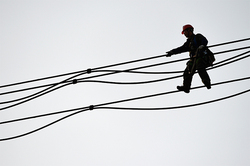 German researchers found that the magnetic field produced by high voltage power lines, markedly affect hormonal changes. Most likely, the animals that graze in places that have more chances of getting cancer. German researchers found that the magnetic field produced by high voltage power lines, markedly affect hormonal changes. Most likely, the animals that graze in places that have more chances of getting cancer.
A group of German scientists from the Institute of Duisburg in Essen set out to figure out what is the impact of high voltage power lines on the health of animals grazing near them, notify Heilpraxisnet. "We decided to carry out studies on the calves for the reason that German farmers are very often debating about whether to graze cattle under high voltage transmission lines and affect the health of animals and quality of milk. In addition to this, we found out that cows can sense the magnetic field", - said the head of research Dr. Hynek Burda.
Researchers observed several hundred calves that lived and grazed near the power lines. It turns out that these animals were changing seasonal fluctuations of hormones, particularly melatonin - the sleep hormone.
In the summer its concentration in the blood of the calves was almost 1.5 times higher than normal, and in winter, on the contrary, 60% lower than it should be. As us researchers reported similar behavior hormonal system explains why the results of past experiments were so contradictory. Along with this assessment of influence of magnetic field on the development of cancer, also becomes much more complicated.
Melatonin - a hormone secreted at night by the pineal gland of the brain. Resnesas through the bloodstream to every cell of the body, he performs a variety of functions. Namely, melatonin controls sleep and wakefulness, helps to strengthen the immune system, protects against cancer and Alzheimer's disease.
Previous studies have demonstrated a close relationship between the inhibition of melatonin production and the incidence of leukemia in children living near high-voltage power lines. However, this conclusion requires further scientific evidence.
sections: Society
|